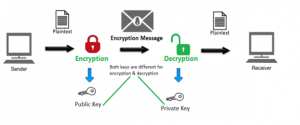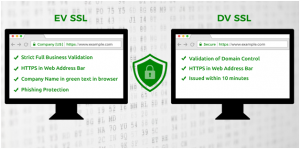SSL certificates have become an integral part of every online business today, and they can make your websites look legitimate and trustworthy to the visitors. They are essential for protecting valuable information about your company and help in enhancing the brand value of your business. In addition, SSL certificates can be useful in boosting your website search engine rankings, and they are especially important for eCommerce sites that deal with sensitive information related to their customers. With different types of SSL certificates available in the market, website owners need to be careful in choosing the right type of certificates that meets their specific business requirements.
What is SSL, and how does it work?
- SSL Secure Socket Layer is a security protocol used for creating a secure link between the server and web browser that helps in safeguarding personal information along with credit card details. SSL certificates are digital certificates that form the backbone of reliable Internet security by providing an encrypted connection between the website and the users’ computers. Furthermore, search engines such as Google emphasize on SSL certificates as most new businesses strive to rank high on these search engines. This makes SSL certificates extremely important for both individuals and businesses.
- In fact, Google displays websites without an SSL certificate as not secure when the user visits them, which makes them less trustworthy, and businesses will lose their credibility. SSL certificate provides an increased sense of security to customers so that visitors can stay for a longer time on your website.
- SSL mainly works using the public key infrastructure, which comprises both the private and the public cryptographic key used for encryption and decryption of information. As the name suggests, public keys may be shared with everyone visiting the website, and they may be viewed via the SSL certificate through the browser.
How SSL Works?
- When a browser tries to connect to a web server, it requests the server to identify itself.
- The server in return sends a copy of its SSL certificate.
- The browser then determines the authenticity of the SSL certificate. If the certificate is authenticated, it replies to the server.
- The server in return sends an acknowledgment to begin an encrypted session.
- Finally, an encrypted session is started between the browser and the server.
Types of SSL certificates- Which is better?
There are different types of SSL certificates and essentially the most used ones are Extended Validation (EV SSL), Domain Validation (DV), and the Organization Validation (OV) certificates. The encryption level remains the same for all these certificates, but the vetting and verification process is different for each type of SSL certificate. Let us examine EV SSL certificates, and Domain Validated SSL certificates in detail to understand more about their pros and cons.
EV SSL certificates
EV SSL certificates provide a maximum level of security to the visitors. They are the premium SSL certificates, without any compromise made on the security features. They come with greater warranties required by online companies, banks, and other big corporations. The green bar was a marker of EV SSL certificates and appeared in the address bar with the name of the registered company along with a padlock symbol. However, with the release of Google Chrome 69, the green bar and the company information has been removed from all browsers and the information is visible on clicking the padlock.
Domain Validated certificates
Domain Validated or DV SSL certificates require single step verification and can be obtained easily when compared to other SSL certificates. They are beneficial for enterprises that want to quickly get a certificate for their site and build the trust and credibility of their visitors. There is no manual identity check involved in the process but an automatic verification to check if the individual owns the domain or not.
EV SSL certificates v/s Domain Validated certificates
Stringent verification process
EV SSL certificates tend to provide a greater defense for phishing scams and may be more suitable to the needs of big businesses and are also the highest form of SSL certificate available with SSL providers. Even though all SSL certificates offer data encryption and data integrity, they tend to vary in terms of the amount of identity verification involved in the process.
On the other hand, the verification for DV SSL certificates is not so complex and requires basic proof from the web owners. They may not be able to protect users against serious threats such as phishing scams by imposters. They may not be able to cater to the needs of high-profile websites that require stronger identity verification and added assurance.
Affordability
A domain-validated certificate is a basic level certificate which is easy to obtain and costs less, which makes it suitable for all kinds of small and medium businesses. EV SSL certificates tend to be more expensive as they provide the highest form of security and used by big banks and corporations.
Transparency
Companies can rest assured that their information will stay safe and secure using EV SSL certificate as there is greater transparency in the process with EV authorization providing greater visibility and improving trust and confidence among visitors. DV SSL certification may not be able to provide a high level of transparency and trust or an additional layer of security or assurance to website visitors.
Conclusion
EV SSL certificates may be suitable for organizations that need to protect the sensitive data of users and want to expand their business. On the other hand, DV certificates may be best suited to organizations where security may not be such a major concern, and for enterprises that need affordable SSL solutions. Overall, the choice of SSL certificates depends on the specific needs of the organizations and their business requirements. SSL certificate is a necessity for all types of organizations to prove the legitimacy of their business.












